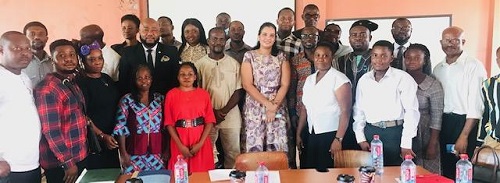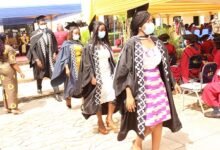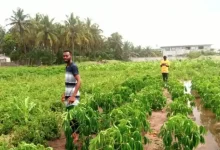
Head of Standard Setting, Verification and Accreditation at Traditional Medicine Practice Council (TMPC), Dr Owusu Yankyera Benedict, has urged the government to invest in organic farming of medicinal plants to improve the quality of herbal medicines and standards.
According to him, most medicinal plants had gone into extinction, while the wholesomeness of the available ones had been comprised due to application of farming chemicals such as pesticides and weedicides.
He was speaking at a lecture on Saturday at the Nyarkotey University College of Holistic Medicines on the theme “Ayurveda System of Medicine-Practice, Principles and Standardisation in Ghana.”
Dr Owusu said standardisation of traditional and alternative medicine hinged on the quality of preparation of the medicines which was guaranteed by the availability, and wholesomeness of the raw materials hence if these qualities were tempered with, standardisation becomes difficult.
He indicated that if focus was not directed at the investment in organic plant materials farming by stakeholders and the cultivation of medicinal plants by practitioners, diseases that were treated in the past could no longer be treated with same plants in modern times because of the unwholesomeness of the materials.
Acting President of Ghana Alternative Medicines Practitioners Association (GAMPA) Dr Albert Arthur, who spoke to the Ghanaian Times on the sidelines of the lecture, called for the passage of the Traditional and Alternative Medicine bill which had been shelved for far too long.
He explained that the Traditional and Alternative Medicines bills were prepared separately at the same period, but the Traditional Medicines Bill had been passed leaving the Alternative Medicines Bill.
He stated that the Traditional Medicine Law was a restrictive one which regulated only traditional medicines, so after a decision to merge the two bills, GAMPA had been working towards the passage of the merge-bill (Traditional and Alternative Medicines) since 2012 but had not seen the light of day.
Principal of Nyarkotey University College of Holistic Medicine, Professor Raphael Nyarkotey Obu, said the field of complementary alternative medicines was diverse with standardisation going on everywhere, therefore, it was time for Ghana to adopt standardisation to help promote the practice.
To him, the government could rake in more revenue if funds were allocated to institutions and researchers to collaborate with TMPC to look at natural organic products and raw materials that could be marketed.
Citing the COVID-19 pandemic where a lot of people resorted to natural remedies, Prof. Obu said Ghana could make a lot of money from selling natural remedies to the outside world, citing India and South Africa as examples.
Director and Principal Consultant af Ayush Ghana Ayurveda Medical Centre, Dr Poornima Lakkanna, for her part, said standardisation was required in the practice of alternative medicine to avoid quackery and ensure patients’ safety and care, improve patient’s experience and confidence in traditional and alternative systems of medicines, minimise errors or risks in practice and improve the efficiency of doctors or health care providers.
FROM KEN AFEDZI-ASHAIMAN







